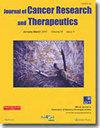Evaluation of patient adherence with oral anticancer agents
IF 1.3
4区 医学
Q4 ONCOLOGY
引用次数: 0
Abstract
ABSTRACT Background: The aim of the study was to measure the adherence to oral anticancer treatments in cancer patients using the Modified Morisky Scale (Modified Medication Adherence Scale 6) which has been shown to be valid and reliable in Turkish. Methods: This study was an observational, single-center study involving 300 cancer patients receiving various oral anticancer agents admitted to our outpatient clinic. Motivation and knowledge scores were calculated as per the Modified Medication Adherence Scale 6. Results: The motivation and knowledge levels of the population aged less than 65 years were found to be significantly higher than the geriatric population (≥65 years old) ( P < .003 and P< .001, respectively). It was observed that the patients with higher education levels had significantly higher motivation and knowledge levels ( P < .0001 for both). There was no correlation between the motivation and knowledge levels of the patients with gender, marital status, living status, and stage of the disease ( P > .05). In addition, the duration of drug use >12 months and the cyclical use of drugs were also found to be significantly associated with increased motivation and knowledge levels. Conclusion: Identifying adherence and related factors, informing patients in detail about the efficacy and toxicity of treatments are the simplest and most basic methods. Particular attention should be paid to patients aged > 65 years, patients with a low level of education, and patients in the earlier stages of their treatments.评估患者对口服抗癌药物的依从性
背景:本研究的目的是使用改良Morisky量表(改良药物依从性量表6)测量癌症患者对口服抗癌治疗的依从性,该量表在土耳其已被证明是有效和可靠的。方法:本研究是一项观察性的单中心研究,纳入了300名在我们门诊接受各种口服抗癌药物治疗的癌症患者。动机和知识得分按照修改药物依从性量表6计算。结果:65岁以下人群的动机和知识水平显著高于老年人群(≥65岁)(P <.003和P<措施,分别)。观察发现,受教育程度越高的患者的动机和知识水平越高(P <两者均为0.0001)。患者的动机和知识水平与性别、婚姻状况、生活状况和疾病分期无相关性(P >. 05)。此外,药物使用的持续时间(12个月)和药物的周期性使用也被发现与动机和知识水平的增加显著相关。结论:明确依从性及相关因素,详细告知患者治疗的疗效和毒副作用是最简单、最基本的方法。应特别注意年龄较大的患者。65岁,受教育程度低的患者,以及处于治疗早期阶段的患者。
本文章由计算机程序翻译,如有差异,请以英文原文为准。
求助全文
约1分钟内获得全文
求助全文
来源期刊
CiteScore
1.80
自引率
15.40%
发文量
299
审稿时长
6 months
期刊介绍:
The journal will cover technical and clinical studies related to health, ethical and social issues in field of Medical oncology, radiation oncology, medical imaging, radiation protection, non-ionising radiation, radiobiology. Articles with clinical interest and implications will be given preference.

 求助内容:
求助内容: 应助结果提醒方式:
应助结果提醒方式:


